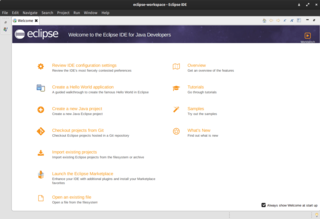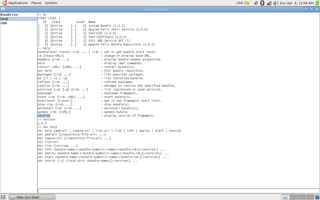
OSGi is an open specification and open source project under the Eclipse Foundation.

SOAP is a messaging protocol specification for exchanging structured information in the implementation of web services in computer networks. It uses XML Information Set for its message format, and relies on application layer protocols, most often Hypertext Transfer Protocol (HTTP), although some legacy systems communicate over Simple Mail Transfer Protocol (SMTP), for message negotiation and transmission.
A web container is the component of a web server that interacts with Jakarta Servlets. A web container is responsible for managing the lifecycle of servlets, mapping a URL to a particular servlet and ensuring that the URL requester has the correct access-rights. A web container handles requests to servlets, Jakarta Server Pages (JSP) files, and other types of files that include server-side code. The Web container creates servlet instances, loads and unloads servlets, creates and manages request and response objects, and performs other servlet-management tasks. A web container implements the web component contract of the Jakarta EE architecture. This architecture specifies a runtime environment for additional web components, including security, concurrency, lifecycle management, transaction, deployment, and other services.

Eclipse is an integrated development environment (IDE) used in computer programming. It contains a base workspace and an extensible plug-in system for customizing the environment. It is the second-most-popular IDE for Java development, and, until 2016, was the most popular. Eclipse is written mostly in Java and its primary use is for developing Java applications, but it may also be used to develop applications in other programming languages via plug-ins, including Ada, ABAP, C, C++, C#, Clojure, COBOL, D, Erlang, Fortran, Groovy, Haskell, JavaScript, Julia, Lasso, Lua, NATURAL, Perl, PHP, Prolog, Python, R, Ruby, Rust, Scala, and Scheme. It can also be used to develop documents with LaTeX and packages for the software Mathematica. Development environments include the Eclipse Java development tools (JDT) for Java and Scala, Eclipse CDT for C/C++, and Eclipse PDT for PHP, among others.

Bonjour is Apple's implementation of zero-configuration networking (zeroconf), a group of technologies that includes service discovery, address assignment, and hostname resolution. Bonjour locates devices such as printers, other computers, and the services that those devices offer on a local network using multicast Domain Name System (mDNS) service records.
Zero-configuration networking (zeroconf) is a set of technologies that automatically creates a usable computer network based on the Internet Protocol Suite (TCP/IP) when computers or network peripherals are interconnected. It does not require manual operator intervention or special configuration servers. Without zeroconf, a network administrator must set up network services, such as Dynamic Host Configuration Protocol (DHCP) and Domain Name System (DNS), or configure each computer's network settings manually.

Avahi is a free zero-configuration networking (zeroconf) implementation, including a system for multicast DNS and DNS Service Discovery. It is licensed under the GNU Lesser General Public License (LGPL).
Extensibility is a software engineering and systems design principle that provides for future growth. Extensibility is a measure of the ability to extend a system and the level of effort required to implement the extension. Extensions can be through the addition of new functionality or through modification of existing functionality. The principle provides for enhancements without impairing existing system functions.
WebSphere Application Server (WAS) is a software product that performs the role of a web application server. More specifically, it is a software framework and middleware that hosts Java-based web applications. It is the flagship product within IBM's WebSphere software suite. It was initially created by Donald F. Ferguson, who later became CTO of Software for Dell. The first version was launched in 1998. This project was an offshoot from IBM HTTP Server team starting with the Domino Go web server.
The Java Class Loader, part of the Java Runtime Environment, dynamically loads Java classes into the Java Virtual Machine. Usually classes are only loaded on demand. The virtual machine will only load the class files required for executing the program. The Java run time system does not need to know about files and file systems as this is delegated to the class loader.
OpenSAF is an open-source service-orchestration system for automating computer application deployment, scaling, and management. OpenSAF is consistent with, and expands upon, Service Availability Forum (SAF) and SCOPE Alliance standards.

Apache Felix is an open source implementation of the OSGi Core Release 6 framework specification. The initial codebase was donated from the Oscar project at ObjectWeb. The developers worked on Felix for a full year and have made various improvements while retaining the original footprint and performance. On June 21, 2007, the project graduated from incubation as a top level project and is considered the smallest size software at Apache Software Foundation.

Merb is a discontinued model–view–controller web framework in Ruby, notable as a precursor to Rails 3. It brought increased focus on speed and modularity to Rails 3. The name Merb is a contraction of "Mongrel" and "Erb".

Managed Extensibility Framework (MEF) is a component of .NET Framework 4.0 aiming to create lightweight, extensible applications. It aims to allow .NET application developers to discover and use extensions with no configuration required. It also aims to let extension developers encapsulate code easily and avoid fragile hard dependencies. Furthermore, it aims to allow extensions to be reused across applications. MEF was introduced as a part of .NET 4.0 and Silverlight 4. It was later improved with the release of .NET 4.5 by adding support for generic types and the introduction of a convention-based extension model.
Virgo is an open source, OSGi-based, Java application server. Virgo supports the deployment of OSGi bundles and unmodified Java web applications as well as OSGi-influenced Shared Libraries WARs and Shared Services WARs.
The Application Interface Specification (AIS) is a collection of open specifications that define the application programming interfaces (APIs) for high-availability application computer software. It is developed and published by the Service Availability Forum and made freely available. Besides reducing the complexity of high-availability applications and shortening development time, the specifications intended to ease the portability of applications between different middleware implementations and to admit third party developers to a field that was highly proprietary in the past.
Pimcore is an open-source enterprise PHP software platform for product information management (PIM), master data management (MDM), customer data management (CDP), digital asset management (DAM), content management (CMS), and digital commerce.

iDempiere. Community Powered Enterprise, also known as OSGi + ADempiere, is an open source Enterprise Resource Planning (ERP) software that is fully navigable on PCs, tablets and smartphones, it also has customer relationship management (CRM) and supply chain management (SCM) functions. It is in contrast to proprietary or most other open source ERP solutions driven only by a community of supporters.
Kubernetes is an open-source container orchestration system for automating software deployment, scaling, and management. Originally designed by Google, the project is now maintained by a worldwide community of contributors, and the trademark is held by the Cloud Native Computing Foundation.









